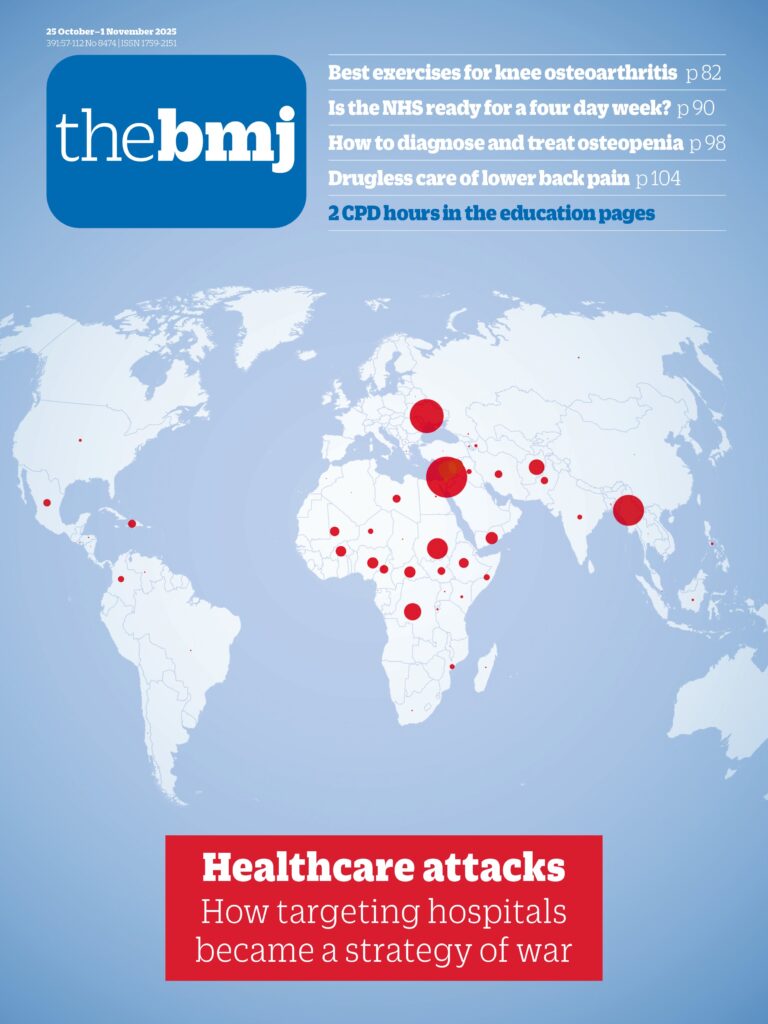Strikes by resident doctors have made medical students more politically engaged, yet increasingly cautious about a future career in the NHS, says Srishruthi Thirumalai
When I started medical school, the NHS felt like a constant. The idea that resident doctors might strike for months on end seemed unimaginable. Yet for those of us training now, strikes have become routine. Each time a picket line forms outside our hospitals, we’re reminded that we’ll soon be among them—with our shifts and the conditions we work under on the line.
Resident doctors have taken industrial action before, in the 1970s and again in 2015-16, but what sets this period apart is the scale and persistence of the walkouts.1 For medical students, the strikes are not abstract disputes between unions and the government; they form part of the backdrop to our training and are reshaping how we see our futures. This prolonged period of industrial action fosters solidarity, but it also risks fuelling disillusionment. Unless policy makers respond, the NHS risks losing the next generation of doctors.
For many of my peers, showing solidarity with resident doctors has been instinctive. We have joined them on hospital picket lines and added our voices in support online. Clinical placements are full of conversations about pay erosion and burnout. Rather than distancing us from the profession we’ll soon join, the strikes have deepened our sense of belonging to it. One final year student told me, “Standing outside with doctors who were striking made me feel like part of the team for the first time.” That feeling of collective identity—of fighting for a fairer deal together—is powerful. But solidarity has not come without disruption.
Medical schools gave different instructions during strike days. At mine, we were told to attend placements as usual, even when most of the team was absent. Friends elsewhere reported cancelled teaching or being told to stay at home. The inconsistency created frustration and, in some cases, guilt. One student told me she felt uncomfortable clerking patients on a strike day while colleagues stood outside on the picket line. The result is a patchwork of experiences: some students lost weeks of clinical exposure, while others continued almost as normal. For students preparing for finals, this uncertainty has been unsettling.
Beyond the immediate disruption lies a deeper shift of creeping disillusionment. Strikes have turned the realities of NHS working life into daily headlines. Reports of pay erosion and unsafe staffing have become part of how we imagine our futures. Conversations among students increasingly turn to working abroad or delaying training. The “brain drain” that once felt like a distant policy worry is now discussed casually in medical school common rooms.
Not everyone feels discouraged. Some students see the strikes as a crash course in advocacy. They argue that medicine has always been shaped by politics, and that learning to use our collective voice is as important as mastering the clinical curriculum. For them, this wave of industrial action has been empowering. Yet even here, the impact is profound: strikes are no longer something students read about in history books, but a lived experience that shapes how we understand professionalism and ethics.
Others feel conflicted. They support the principle of fair pay but worry that prolonged strikes harm patients and erode public trust. These conversations are difficult but they are reshaping our ethical outlook. Questions about the balance between a doctor’s duty to patients and duty to colleagues are no longer theoretical; they are real dilemmas that medical students are grappling with now.
It’s clear that these strikes are not background noise. They are shaping how medical students think about their futures—from the decision to remain in the NHS to how we imagine our role within it. If policy makers want to retain the next generation of doctors, they need to recognise this shift. That means offering clearer guidance during strikes and more support for students caught between conflicting expectations.
The resident doctors’ strikes have shown the cracks in our health system. For students, they have also indicated what kind of doctors we may become: more politically aware and outspoken, yet increasingly cautious about committing to a career in the NHS. That should concern us all.
Footnotes
-
Competing interests: None declared.
-
Provenance and peer review: Not commissioned, not externally peer reviewed.

